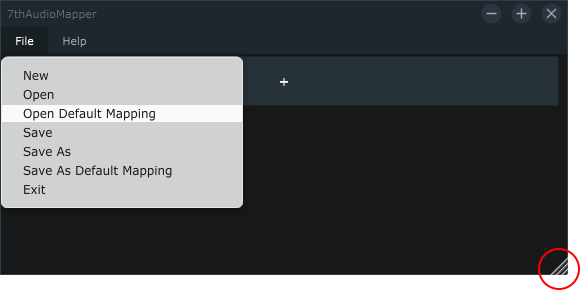Audio channels in supplied media may not match theatre speaker location requirements. They may simply need to be reversed, ignored, or reassigned between output locations – such as channels split between screen locations and ride vehicles. Audio media resources in a show may also need to be adjusted for consistent sound balance. For example, the same show might be used in acoustically different theatres, or ride vehicle channel volumes need to be lower.
7thAudioMapper creates a JSON audio mapping file for DeltaAudio to use. The structure of this file is a series of input-output channel mappings with per channel volume, operating in order of priority. Each input-output mapping can be filtered according to audio file characteristics: for named files, files of a type, with specific number of inputs, with a particular prefix, or on a particular timeline.
Use with Delta versions
Whilst custom audio mapping has been available in Delta from version 2.5.33, AudioMapper was introduced with installations of Delta 2.6.66 as a more convenient way of writing the JSON files. From that version on, the app will already be in C:\Program Files\7thSense\Delta\Utilities.
If using an earlier version of Delta, obtain the file ‘AudioMapper.exe’ from support@7thsense.one and copy it into C:\Program Files\7thSense\Delta\Utilities. The app will be added to the Windows Start menu.
•AudioMapper simply creates the file for DeltaAudio to read; it does not need to be running with a show.
•Mapped channels all have their own volume level controls.
•The maximum number of inputs and of outputs is 64.
•Each set of filters and its input/output map is called a mapping. Up to 64 of these mappings can be added to the JSON file.
To enable AudioMapper to work, registry key Delta/Hardware/AudioEnableCustomMapping must be set to 1.
Registry Edits |
7thSense software uses the Windows Registry extensively, and on occasion we make recommendations for changes. •Before making any changes, close DeltaGUI and DeltaServer. •DeltaServer can take up to 10 seconds to fully close in the background, even if it appears that all the Windows have closed. Ensure that Delta has fully closed before opening and/or refreshing, and finally editing. The best way to ensure this, is to watch Windows Task Manager > Details list. You will see ‘DeltaServer.exe’ in this list if DeltaServer is still running. If it won’t close for any reason, you can right click on it in the list and choose ‘End Process Tree’. •Make a note of any setting before you change it, in case you want to change it back. •Only make the changes as recommended and only to those registry keys. |
Using AudioMapper
From Windows Start, find Delta > AudioMapper, right-click and find Run As Administrator. This will present a fresh view, toadd new mappings, or open an existing file to edit it. The window can be resized as required.

File Menu
New
Clears the current JSON mapping file from view. Alerts for an open and unsaved file.
Open
Open an existing JSON file to edit, add new maps. Alerts for an open and unsaved file.
Open Default Mapping
Open C:\Program Files\7thSense\Delta\audiomapping.json. Alerts for an open and unsaved file.
Save
Save the current JSON to the current name and location.
Save As Default Mapping
Save the current JSON to the default active name and location (C:\Program Files\7thSense\Delta\audiomapping.json). Alerts that overwriting an existing default mapping file.
Save As
Save the JSON in view to a new filename or location, for example as a backup.
Exit
Closes AudioMapper with an alert for an open and unsaved file.
File locations
The audiomapping.json file must reside in the same folder as DeltaAudio. This is the only file that DeltaAudio will listen to.
Other files, backups or copies can be held anywhere with indicative names, but to make any one the default, open it in AudioMapper and ‘Save As Default’ file.